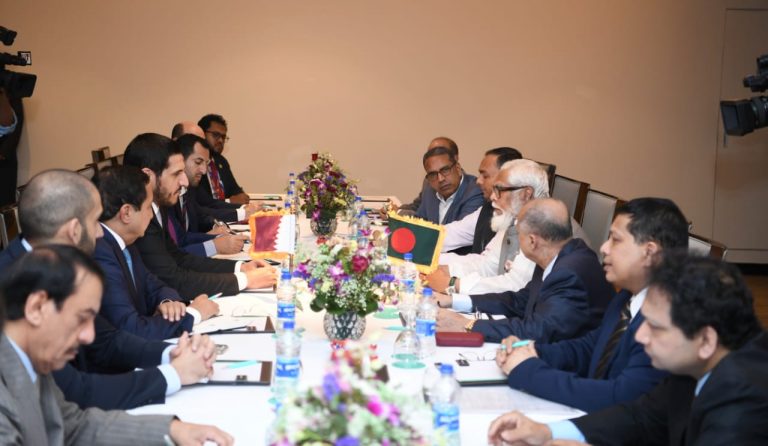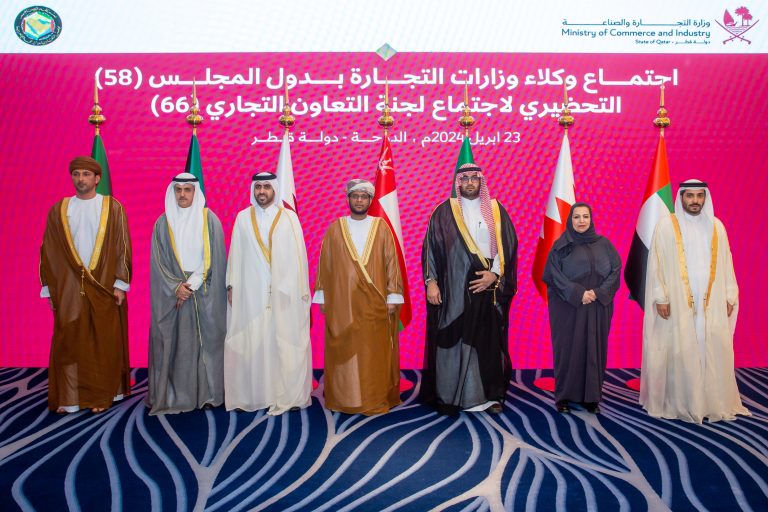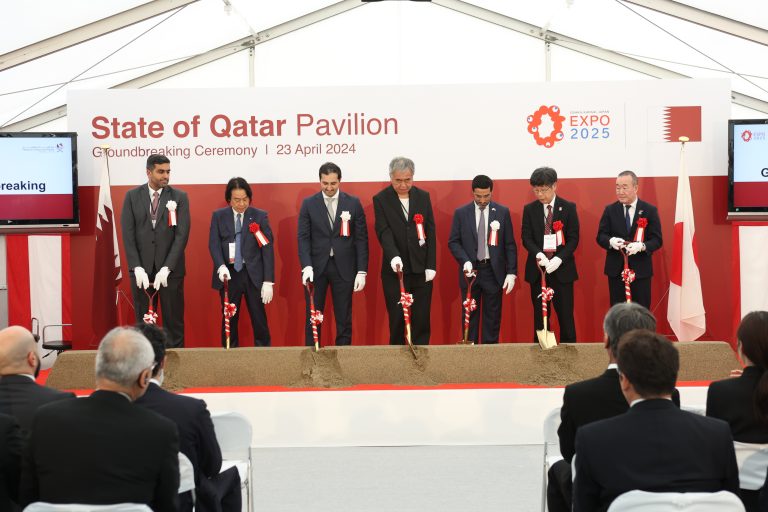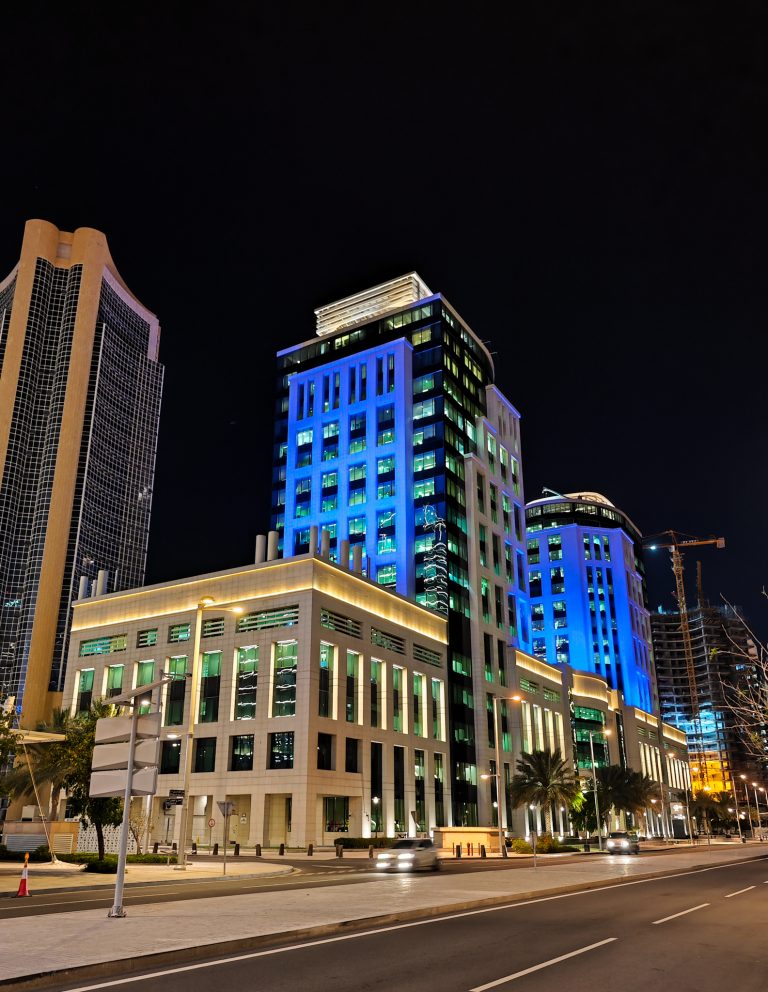High-level meetings, various events mark H.E Minister of Economy and Commerce’s participation in the US-Qatar Strategic Dialogue
english.pdf
Success of the economic, commercial and investment aspects of the US-Qatar strategic dialogue
Both parties discuss regional arrangements, commercial routes and ports established by the State to ease the flow of goods and services to and from Qatar through neighboring countries, and to bolster joint cooperation in line with international mechanisms in a bid to accomplish joint interests.
Both parties agreed on the importance of holding the US-Qatar Trade and Investment Committee TIFA meeting in Doha before the end of 2018.Both sides welcomed a proposal to discuss the ratification of a free trade agreement between the State of Qatar and the US to promote trade preferences.The US-Qatar TIFA meeting which will be held in Doha before the end of 2018 will touch on the US-Qatar Free Trade Agreement, the agreement on the promotion and protection of joint investments, the trade and food safety agreement, cooperation in the fields of intellectual property, customs cooperation, cooperation in the field of the World Trade Organization, cooperation related to small and medium-sized enterprises, and other areas of mutual interest.The US-Qatar Business Council is the first business council to be formed between the US and a Gulf state. Its members include major companies such as Boeing, Exxon Mobil, ConocoPhillips and others.The Minister gave instructions to provide support for the US-Qatar Business Council and expand its membership to include small and medium enterprises.The US side welcomed the Qatari economic mobility program, which will be organized during the first half of 2018 in a number of major cities in the United States.More than 102 fully owned US companies and more than 505 joint Qatari-US firms are currently operating in Qatar.The US is Qatar’s sixth-largest trading partner, with a total of $6 billion worth of traded goods.More than 5,000 US nationals currently work in the private sector in Qatar, and a million American jobs depend on business with Qatar.
High-level meetings and various events marked the participation of H.E. Sheikh Ahmed bin Jassim bin Mohammed Al-Thani, Minister of Economy and Commerce, in the US-Qatar Strategic Dialogue, which concluded on Wednesday in Washington DC. The minister’s activities aimed at promoting bilateral economic and trade cooperation, and highlighting Qatar’s remarkable economic success over the past period and its future prospects in line with the Qatar Vision 2030.
His Excellency’s activities included a number of bilateral meetings in addition to his participation in a number of events on the sidelines of the US-Qatar Strategic dialogue, including a reception organized by the US Chamber of Commerce. H.E. also chaired a session on promoting Qatari-US bilateral trade and investment, and participated in a business lunch organized by the US-Qatar Business Council.
H.E. Sheikh Ahmed held bilateral meetings with Mr. Wilbur Ross, US Secretary of Commerce, Ambassador Anne Paterson, Chairman of the US-Qatar Business Council, Mr. Steven Mnuchin, US Secretary of Treasury and Mr. Dan Mullaney, Assistant United States Trade Representative.
Discussions touched on the promotion of economic, trade and investment bilateral ties, and the prospects of economic and trade cooperation.
The outcome of these meetings demonstrated the success of the economic, trade and investment aspects of the US-Qatar Strategic Dialogue, namely the session on the promotion of Qatari-US bilateral trade and investment, which was chaired by H.E. Sheikh Ahmed bin Jassim bin Mohammed Al-Thani, Minister of Economy and Commerce.
The session brought together H.E. Mr. Ali Shareef Al Emadi, Minister of Finance, and H.E Sheikh Abdullah bin Mohammed bin Saud Al Thani, Chief Executive Officer of Qatar Investment Authority, along with other government representative.
The US delegation included the Assistant Secretary of State for Economic and Business Affairs and Assistant Secretary for Global Markets, along with representatives of the Office of the United States Trade Representative, the Bureau of Democracy, Human Rights and Labor Affairs, the Office of International Relations, the Office of Intellectual Property Rights, and the Commercial Law Development Program.
The meeting touched on topics related to access to markets, government procurement, setting up a commercial presence in Qatari markets, the US-Qatar TIFA committee, intellectual property, the Convention against Trafficking in Human Beings, the telecommunications security agreement, and the trade and food safety agreement.
The US-Qatar Strategic Dialogue on economic and investment cooperation resulted in the signing of a number of agreements, memoranda of understanding and a letter of intent for cooperation in the fields of telecommunications, smart cities and combating human trafficking.Other agreements, including US-Qatari free trade and investment agreements, intellectual property, trade, and food safety, will be discussed during the meeting of the TIFA Committee in Doha before the end of 2018.
During his meeting with Mr. Steven Mnuchin, US Secretary of Treasury, the minister discussed regional arrangements on trade routes and ports established by the State of Qatar to facilitate the flow of goods and services to and from Qatar according to international mechanisms in a bid to achieve joint interests.
In the same context, H.E. Sheikh Ahmed met with Mr. Wilbur Ross, US Secretary of Commerce. Mr. Ross hailed the Qatar economy’s performance and the measures undertaken by Qatar under the unjust embargo, while expressing his country’s satisfaction with the status of US companies in Qatar.
The US Secretary of Commerce also welcomed and voiced support for the Qatari mobility economic program, spearheaded by the Minister of Economy and Commerce. The program will be organized during the first half of 2018 in a number of major cities across the US.
During his meeting with Mr. Dan Mullaney, Assistant United States Trade Representative for Europe and the Middle East, the minister discussed WTO-related issues and the US-Qatari free trade agreement. Both parties agreed to hold the upcoming TIFA committee meeting in Doha before the end of 2018.
During a meeting with Ambassador Anne Paterson, Chairman of the US-Qatar Business Council, H.E. Sheikh Ahmedhighlightedthe importance of supporting the US-Qatari Council, bolstering its activities and expanding membership to include SMEs.
Both the Qatari and US sides also agreed to follow up on the outcome of these meetings through the US-Qatar Joint Committee on Trade and Investment that will meet in Doha before the end of 2018.
The US is a key strategic partner of Qatar
In addition to his participation in gatherings and bilateral meetings, His Excellency Sheikh Ahmed bin Jassim bin Mohammed Al-Thani, Minister of Economy and Commerce, took part in a number of activities on the sidelines of the US-Qatar strategic dialogue aimed at bolstering and enhancing bilateral ties to the benefit of both countries.
During his participation in the reception organized by the US Chamber of Commerce to honor the Qatari delegation participating in the Qatar-US Strategic Dialogue, H.E. Sheikh Ahmed seized the opportunity to shed light on key number and facts relating to bilateral economic, trade and investment relations.
He noted that the US is Qatar’s sixth-largest trading partner, with a total of $6 billion worth of traded goods.
H.E. also said that the US is the top source of Qatari imports at 16% in 2017, adding that the trade balance registered a surplus of $5 billion dollars in favor of the US.
More than 505 joint Qatari-U.S. firms and around 102 fully owned U.S. companies are operating in Qatar, including 20 companies that operate in the field of gas and petroleum, while around 40 US companies are licensed under the umbrella of the Qatar Financial Centre.
Sheikh Ahmed highlighted that Qatar has been increasing its investments in the United States over the years, creating millions of jobs across America. These include partnerships with numerous American companies, such as ExxonMobil, ConocoPhillips and Raytheon.
In this context, H.E. the minister pointed out that more than 5,000 US nationals currently work in the private sector in Qatar, while a million other American jobs depend on business with Qatar.
H.E. also hailed the Qatar Investment Authority for pledging to invest $35 billion for the period from 2015 to 2020, and an additional $10 billion for infrastructure sector.
He noted that the investment program is moving along this target after Qatar Airways alone provided a $92 billion boost to the U.S. economy through the purchase of 332 American aircraft, a deal which supports more than 527,000 jobs in the United States.
Illegal blockade helped Qatar bolster its strength
During bilateral meeting on the sidelines of his participation in the reception organized by the US Chamber of Commerce, the minister touched on the illegal blockade imposed on the State of Qatar on 5 June last year.
H.E. highlighted that the US-Qatari gathering comes at a time of global economic uncertainties and challenging circumstances for Qatar, following the imposition of the illegal blockade.
The blockade is aimed at undermining Qatar’s position as an economically-independent and sovereign state, the minister said.
However, today, Qatar emerges stronger and more independent than ever before, he added.
H.E. stressed that the illegal blockade has presented an opportunity for Qatar to make its economy more open to the world.
In this context, the minister said Qatar has successfully established direct commercial routes with a number of strategic hubs around the world, diverting trade to its major trading partners.
Touching on the Qatari economy, H.E. said the wise policies adopted by the State contributed to increased productivity across all sectors, which reflected positively on the national economy and led to positive growth rates over the past year, reflecting Qatar’s economic resilience and ability to weather the illegal blockade.
During the session to promote US-Qatari bilateral trade and investment, the minister also touched on the unfair siege.
However, under the wise guidance of its leadership, Qatar has managed to weather the challenges of the blockade and maintain normal activity across all economic sectors, the minister said.
The minister added that Qatar has used Hamad Port to launch new shipping routes to strategic ports around the world, improving the country’s position as a regional trade hub.
Through Hamad International Airport, Qatar has maintained passenger and cargo traffic at a normal pace to more than 150 destinations worldwide, the minister said.
But more importantly, the minister said, the blockade presented Qatar an opportunity to fast track the implementation of measures aimed at achieving self-sufficiency across vital sectors, in partnership with the private sector.
He added that Qatar has pursued its years-long efforts to diversify its national economy and open up its economy to the world.
Qatari Economy…Numbers and facts
The reception organized by the US Chamber, and the business lunch organized by the US-Qatar Business Council, presented opportunities to shed light on the performance and success of the Qatari economy in 2017
In 2017, Qatar’s GDP Increased to $220 billion, compared with $218 billion in 2016, the minister said, noting that the country’s annual real GDP growth rate at constant price reached 2% in 2017.
Quoting the latest report released by the World Bank, H.E. said Qatar’s real GDP growth is expected to increase to 2.6% in 2018.
Qatar’s foreign trade has also shown remarkable growth in 2017, with the total foreign trade volume increasing by 16% in 2017 to reached $103 billion, compared with $89 billion in 2016.
Qatar’s total exports increased by 19% to reach $68 billion in 2017, up from $ 57 billion in 2016, reflecting positively on the trade balance, which recorded a significant surplus at 40% — up from $25 billion in 2016 to $35 billion in 2017.
All these positive indicators demonstrate that Qatar has overcome the blockade and enhanced its economic competitiveness, which positions Qatar as a highly attractive destination for US investments.
Discussions touched on the investment climate in Qatar, which is one of most politically stable countries in the Middle East with an economy that performed well, driven by petroleum sector revenues despite global and regional challenges.
Participants also praised the wisdom of the country’s leadership and its decision to transform Qatar by 2030 into a knowledge-based economy driven by the private sector.
Thus, the government is adapting its business model to this vision, the minister said, noting that Qatar is positioning itself to be a private sector-driven regional hub for trade in high tech and value-added goods and services, as well as to attract workers with world-class skills to support investments and internal markets in the state of Qatar.
Discussions touched on Qatar’s business environment, which is being designed and improved to diversify the economy and encourage foreign direct investments. In addition to the backing provided by a strong sovereign credit rating, foreign investors now enjoy a flat low rate of taxation, guarantees of ownership, a business-friendly environment and a world class infrastructure for improved access to regional markets.
Discussions also touched on the special incentives provided by the state of Qatar for projects being implemented in key sectors, in addition to 100% ownership and tax exemptions for up to six years.
Promoting Qatari-US bilateral trade and investment
H.E. Sheikh Ahmed bin Jassim bin Mohammed Al-Thani, Minister of Economy and Commerce, also chaired a session to promote Qatari-U.S. bilateral trade and investment.
During the session, H.E. discussed efforts to bolster bilateral trade and highlighted cooperation prospects in various trade-related fields, while tackling challenges facing the promotion of bilateral investments.
Participants also highlighted the incentives offered by the State of Qatar to attract foreign investment, and discussed mechanisms to follow up on the implementation of agreements by the US-Qatar Trade and Investment Council (TIFA).
During the session, participants also hailed the historic and friendly ties between the State of Qatar and the US These ties were further bolstered by Trade and Investment Framework Agreement (TIFA) signed in 2004, participants noted, adding that US-Qatari Strategic Dialogue represents a key step towards building on these achievements.
Discussions also touched on the new laws issued by Qatar in order to attract and promote local and foreign investments.
These include a new draft law to regulate the investment of non-Qatari capital in economic activity, which the Cabinet recently endorsed in line with the directives of His Highness the Emir Sheikh Tamim bin Hamad Al-Thani.
The law facilitates foreign investor’s access to the Qatari market by providing incentives in terms of land allocation to non-Qatari investors seeking to set up projects, tax and customs exemptions and enabling the free transfer of investments to and from Qatar.
Qatar has also introduced amendments to its law on investment free zones, which provides further incentives to investors seeking to set up businesses in Qatar.
The amended law on investment free zones abolishes all barriers and restrictions on capital movement and facilitates the introduction of modern technologies into investment projects.
During the session on the promotion of bilateral trade and investments, participants highlighted efforts to bolster Qatar’s business environment, noting the increase in the contribution of the non-oil sector to 52% of GDP in 2017.
Qatar’s success in promoting a diversified economy is evident in the country’s advanced ranking on several international indicators, the minister said, noting that Qatar ranks in second place globally in terms of providing a stable macroeconomic environment and in terms of tax impact on business, fourth globally in terms of government efficiency, eighth in terms of economic performance and 18th on the Global Competitiveness Index 2016 Report.
Participants also outlined efforts to bolster trade and economic cooperation across various sectors, which will strengthen the U.S. position as Qatar’s top trading partner.
Today, around 40 US companies are licensed under the umbrella of the Qatar Financial Centre.
Thus, the private sector in both countries is well-positioned to tap a multitude of existing investment opportunities, the minister said.
According to his excellency, these include infrastructure projects related to the FIFA World Cup 2022, investments in Qatar’s tourism sector ahead of state plans to attract 5.6 million visitors annually by 2023, in addition to large scale projects in food security, education and health services.
The US-Qatari Strategic Dialogue and auxiliary events, including bilateral meetings and discussions with key economic figures, provided another opportunity to expand bilateral economic, trade and investment cooperation to the benefit of both countries in light of the enormous potential of their economies.
Success of the economic, commercial and investment aspects of the US-Qatar strategic dialogue
February 05, 2018








